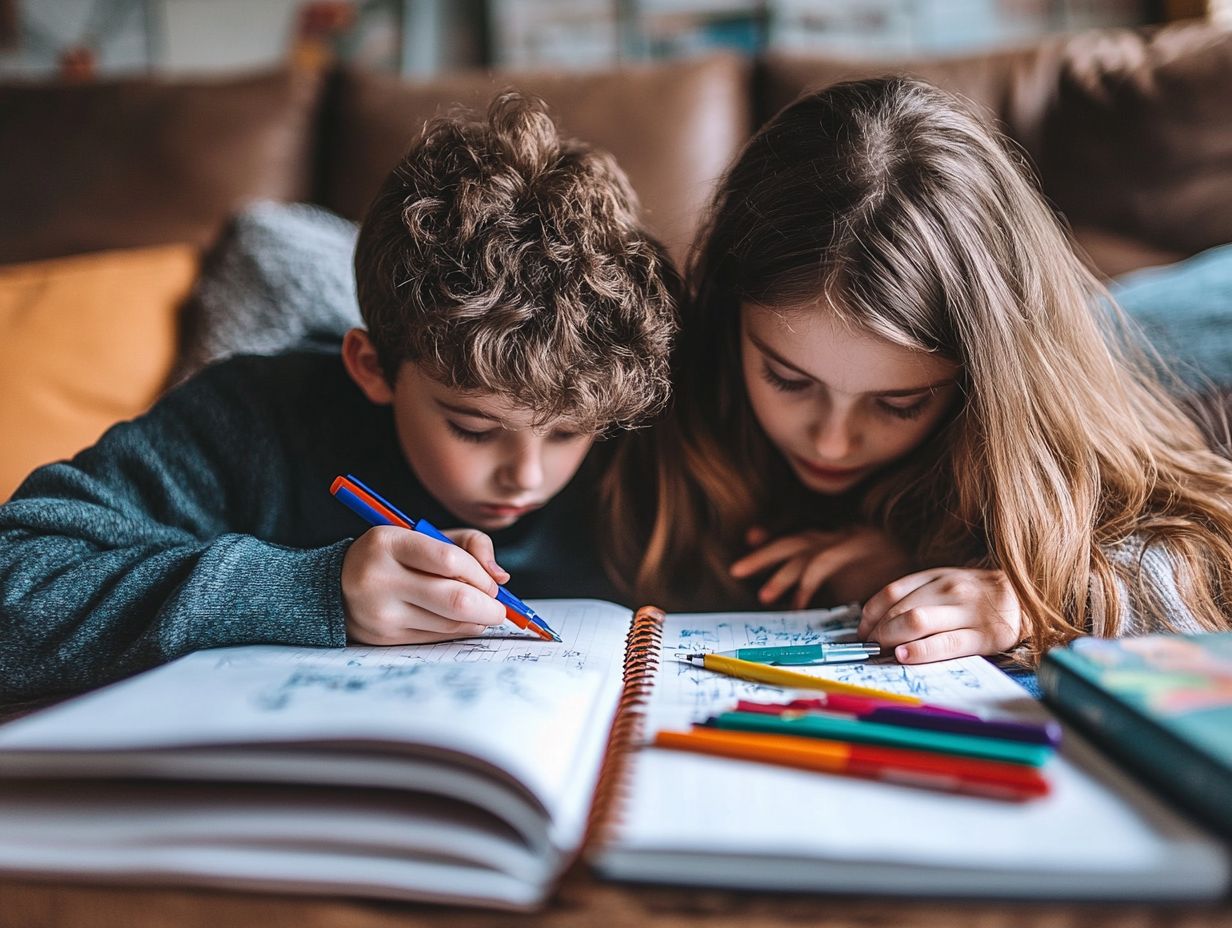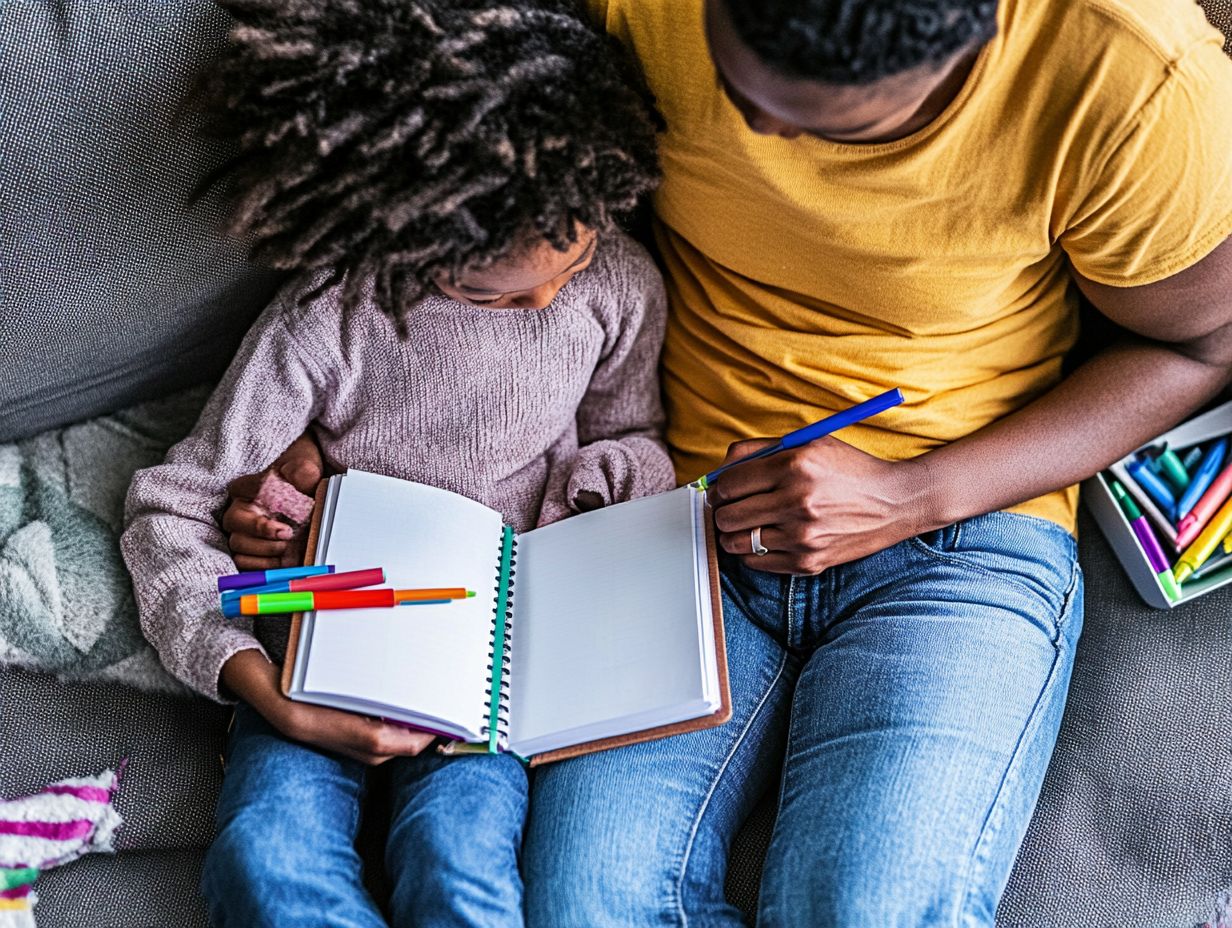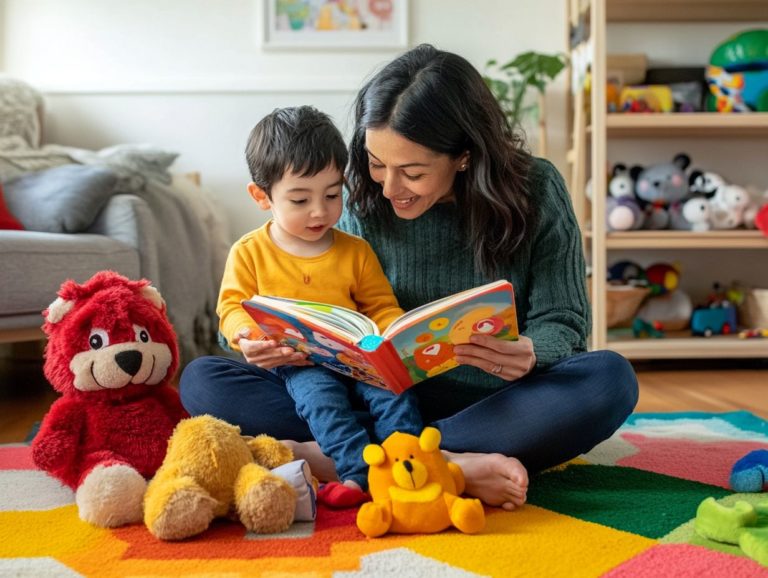The Benefits of Journaling for Parent-Child Talks
Journaling transcends the simple act of putting pen to paper; it serves as a powerful medium that can significantly enhance the communication between you and your children, fostering a deeper bond.
This practice fosters open dialogue, elevates emotional intelligence, and nurtures stronger relationships. There are various types of journaling to explore, ranging from traditional notebooks to creative art journals, along with practical tips for you to seamlessly integrate this practice into your conversations with your kids, helping them express their feelings and thoughts.
Discover how journaling can transform your family conversations today! Uncover how to cultivate a safe space for expression and connection through the enriching art of journaling, creating a loving and supportive environment for your family.
Contents
- Key Takeaways:
- What Is Journaling? A Journey of Self-Discovery and Connection
- How Can Journaling Help with Parent-Child Talks?
- What Are the Different Types of Journaling?
- 2. Digital Journaling
- 3. Art Journaling
- How Can Parents Incorporate Journaling into Their Talks with Children?
- What Should Parents Keep in Mind When Journaling with Children?
- Frequently Asked Questions
- 1. What is journaling and how can it benefit parent-child talks?
- 2. How can journaling improve communication between parents and children?
- 3. Can journaling help parents and children resolve conflicts?
- 4. What are some other benefits of journaling for parent-child talks?
- 5. Can journaling be used for younger children as well?
- Do Parents and Children Both Need to Journal?
Key Takeaways:

- Unlock open communication through journaling! Journaling encourages open communication between parents and children, providing a safe space for expression and strengthening their relationship.
- Transform emotional intelligence! Incorporating journaling into parent-child talks can improve emotional intelligence and help children process their thoughts and emotions, providing valuable insights into their inner world.
- Ensure a positive experience! Parents should respect boundaries, allow for creative expression, and be non-judgmental when journaling with their children to make it a positive and beneficial experience.
What Is Journaling? A Journey of Self-Discovery and Connection
Journaling serves as a profound reflective writing exercise, offering you and your children a unique opportunity to delve into your thoughts and feelings within a safe and nurturing space. This practice fosters a deeper connection.
By documenting your daily experiences and emotions, you engage in a journey of self-discovery. This also cultivates deeper connections through shared memories. This practice not only invites creative expression but also sharpens your communication skills. It positions journaling as an invaluable tool for personal growth and relationship enhancement. Additionally, this reflective exercise provides a safe space for children to explore their feelings and experiences.
How Can Journaling Help with Parent-Child Talks?
Journaling can be a remarkable tool for elevating communication during parent-child discussions. It enables both of you to articulate your feelings and thoughts in a thoughtful and organized way, enhancing your relationship.
By putting emotions into words, parents and children can gain valuable insights into one another s perspectives. This process cultivates a deeper understanding and trust within the relationship. This practice helps in handling tough discussions and also fosters emotional intelligence. It strengthens the bonds among family members, creating a loving and supportive family environment.
1. Encourages Open Communication
Encouraging open communication through journaling enables you and your children to share your feelings and thoughts without the sometimes-daunting pressure of face-to-face conversations. This fosters a deeper connection and understanding.
This approach offers each family member the freedom to express their emotions in a personal and reflective manner. It nurtures a deeper understanding of one another’s experiences. For instance, a prompt like “What made you feel happy today?” invites family members to recognize and celebrate the little joys in life. Meanwhile, a question such as “What challenges did you face this week?” paves the way for discussions about struggles and resilience, ultimately fostering emotional growth.
By cultivating this safe haven, you can gradually peel back the layers of your thoughts and feelings. This sets the stage for more profound conversations as time goes on.
What Are the Different Types of Journaling?
You ll find that there are various types of journaling tailored to different preferences and styles. Whether you prefer the tactile experience of traditional pen and paper journaling, the convenience of digital journaling, or the expressive nature of creative art journaling, each method offers distinct benefits for both parents and children.
2. Improves Emotional Intelligence
Journaling serves as a powerful tool for enhancing emotional intelligence. It invites both parents and children to explore their feelings and recognize their emotional responses.
This practice helps you understand your inner world better, enabling you to articulate your emotions with clarity. As you write, you can investigate the origins of your feelings be it joy, anger, or sadness leading to a heightened sense of self-awareness and empathy, which are crucial for emotional development.
When you and your children engage in this reflective exercise, you embark on a transformative journey of self-discovery that enriches your relationships. The insights gained not only improve communication but also equip you with essential tools for navigating complex emotional landscapes. This ultimately fosters greater emotional understanding and resilience over time.
3. Builds a Stronger Relationship
Engaging in journaling together can significantly strengthen the bond between you and your child. It creates a platform for trust, empathy, and open communication.
This shared experience allows both of you to express thoughts and feelings in a safe environment, fostering deeper connections. For instance, consider posing prompts like, “What was the best part of your day?” or “Describe a challenge you faced this week.“
These questions encourage your child to reflect and share, providing insights into each other s lives while cultivating an atmosphere where feelings are validated.
When you thoughtfully respond to each other’s writing, you enhance trust and create a nurturing space where vulnerability is welcomed, ultimately nurturing a strong, resilient relationship built on mutual understanding.
4. Provides a Safe Space for Expression

Journaling offers you and your child a secure sanctuary to share feelings and thoughts openly, without the worry of judgment or misunderstanding. This fosters a trusting and empathetic relationship.
This practice cultivates a welcoming environment where emotions can flow freely, promoting heartfelt communication and genuine reflection. By lowering your defenses, you can explore the richness of your emotions be it joy, sadness, or confusion allowing for an authentic release that often feels suppressed in daily life.
This environment supports emotional and psychological growth for both you and your child. The blank page transforms into a trusted confidante, providing a canvas for personal stories and experiences that might otherwise remain unspoken.
As you write down your thoughts, they become clearer and more manageable, fostering a sense of relief and enhancing emotional awareness and resilience for both you and your child.
1. Traditional Pen and Paper Journaling
Traditional pen and paper journaling is a timeless choice that many individuals still cherish. It offers a tactile and personal avenue for documenting your feelings, thoughts, and experiences.
This method allows you to express yourself with a unique touch, fostering a deeper emotional connection with your inner thoughts and enhancing your writing skills.
Unlike digital alternatives, traditional journaling encourages you to reflect without the distractions that often come with technology, promoting mindfulness in the process. For both parents and children, engaging in journaling together creates a shared space for communication.
It opens up avenues for open dialogue about emotions, challenges, and dreams, transforming it into an excellent bonding activity. In this way, journaling evolves from a solitary endeavor into a collaborative practice, enriching relationships and nurturing emotional intelligence.
2. Digital Journaling
Digital journaling has surged in popularity, and it’s easy to see why. It offers you and your children the convenience and accessibility to document thoughts and feelings across various devices. Digital journaling offers an organized and engaging way to capture daily events and emotions, making it easier to connect and share.
With a wealth of user-friendly apps designed for different age groups, digital journaling appeals to both tech-savvy youngsters and their caregivers alike. These platforms often come equipped with interactive features, encouraging family conversations and allowing families to create shared entries or comment on one another s reflections.
This practice nurtures individual expression and enhances communication. It offers you and your children a unique opportunity to connect and gain a deeper understanding of each other’s experiences.
3. Art Journaling
Art journaling uniquely blends visual creativity and writing, providing you with an exceptional outlet for self-expression and emotional exploration, whether you re a parent or a child. This method allows for the expression of complex emotions and thoughts through creative means, enhancing emotional understanding and skills.
This practice also encourages you to express your thoughts creatively through drawings, paintings, and written words, crafting a safe haven to confront and reflect on your feelings. As you and your family engage in this enriching activity together, you not only elevate your creative skills but also nurture open communication, paving the way for deeper connections and understanding. This fun activity opens doors to meaningful conversations that strengthen your bond!
By sharing your art and stories, you can delve into personal challenges and triumphs, ultimately fortifying your bonds and fostering a supportive environment. The emotional benefits extend far beyond the pages, cultivating resilience, empathy, and a profound sense of belonging within your family unit.
How Can Parents Incorporate Journaling into Their Talks with Children?
You can seamlessly weave journaling into your conversations with your children by employing thoughtful journaling prompts, establishing a shared journal, and committing to it as a regular activity. This approach enhances communication and deepens the emotional connection between you and your child, fostering a safe space for sharing and understanding.
1. Use Journaling Prompts

Utilizing journaling prompts can ignite profound conversations between you and your child, guiding them to delve deeper into their feelings and thoughts, fostering emotional intelligence and authentic communication.
For instance, when you encourage your child to write about a time they felt proud, you unlock a pathway for discussions centered on achievements and self-esteem, enhancing your parent-child relationship. Similarly, asking questions like “What was the best part of your day and why?” invites both of you to share moments of joy and gratitude, enriching your connection.
On the flip side, addressing challenges with prompts such as “Describe a situation that made you feel frustrated” opens up a dialogue that allows for understanding, empathy, and emotional processing.
By engaging in this enriching practice, you create a supportive and safe space where your child feels comfortable expressing their emotions and honing their communication skills.
Creating a shared journal invites you and your children to collaboratively document thoughts and experiences. This practice fosters a deeper connection through shared emotions and communication.
It enhances communication and promotes understanding, empathy, and emotional growth among family members. By engaging in writing together, your family can establish a safe space for expressing feelings and ideas.
This environment encourages authentic communication that might otherwise remain unspoken. To embark on this journey, set aside a specific time each week to write, ensuring that everyone has the opportunity to contribute and share.
Utilizing prompts can spark creativity and guide conversations. Encourage everyone to share their everyday moments, thoughts, dreams, and experiences.
Ultimately, this shared journal becomes a cherished keepsake, beautifully reflecting the evolving journey of family connections, relationships, and memories through time.
3. Make Journaling a Regular Activity
Incorporating journaling into your family routine can cultivate an atmosphere of openness, communication, and emotional expression between parents and children. By establishing a consistent journaling practice, you build closer bonds and create a safe space for sharing feelings and thoughts.
Designate specific times during the week for everyone to gather, perhaps right after dinner or just before bedtime. This creates a regular opportunity for everyone to share and connect.
Introducing prompts can serve as a helpful guide for discussions and alleviate the pressure of writing. Additionally, personal reflections encourage a sense of individuality and self-discovery within the shared experience.
Celebrating each other’s entries fosters a supportive environment, significantly enhancing your family’s overall emotional well-being and relationships.
What Should Parents Keep in Mind When Journaling with Children?
When you engage in journaling with children, it’s essential to respect their boundaries. Encourage their creative expression while maintaining a non-judgmental attitude, promoting trust and empathy.
This approach fosters a positive and enriching experience for both you and the child, enhancing your relationship and connection.
1. Respect Boundaries
Respecting boundaries when journaling with children is essential. It allows them to feel safe and comfortable expressing their feelings without the worry of overexposure or judgment.
Establishing clear guidelines about what can be shared fosters a sense of security, trust, and understanding. For instance, you might encourage your child to identify which topics are off-limits for discussion.
This enables them to take control of their personal narrative and express their authentic self. Creating a dedicated journaling space, free from interruptions, can significantly enhance this experience, offering your child the privacy and safe space they need.
You can also model emotional expression by sharing your own journaling experiences. This demonstrates that while it s vital to communicate feelings, it s equally important to uphold personal boundaries and trust in the process.
These practices not only nurture open dialogue but also safeguard emotional well-being and the ability to understand and manage feelings.
2. Allow for Creative Expression
Encouraging creative expression through journaling offers children a unique opportunity to delve into their feelings and thoughts, whether they prefer writing, drawing, or exploring other artistic outlets. This practice promotes self-discovery and authentic expression.
This enriching practice not only cultivates a deeper understanding of their emotions but also fosters a lifelong passion for self-expression and creative growth.
As a parent, you play a crucial role in this process by cultivating a safe and inviting atmosphere for journaling, ensuring it is a supportive and encouraging exercise.
By providing an array of materials think colorful pens, delightful stickers, and blank pages you can ignite their imagination and creativity, promoting self-expression and authentic communication.
Setting aside dedicated time to journal together can open the door to meaningful conversations, allowing your child to share their feelings more freely and fostering emotional intelligence.
It s essential to remind them that there are no right or wrong ways to express themselves; journaling is a personal journey that celebrates their unique perspectives, experiences, and creative expression.
3. Be Non-Judgmental

Being non-judgmental during the journaling process is crucial as it creates a safe space where you can freely express your true feelings and emotions without the fear of criticism or misunderstanding.
This supportive environment fosters emotional safety, enabling you to explore your thoughts with honesty and authenticity.
While journaling, you can dive deep into complex emotions whether that s joy, sadness, anger, or confusion without worrying about how others might interpret your words, promoting self-discovery and emotional growth.
This open line of communication enhances your self-awareness and nurtures resilience and emotional intelligence when facing your emotions.
You ll discover that your perspectives are valid, allowing you to gain a deeper understanding of yourself and your experiences, fostering personal growth and emotional well-being.
By embracing free expression in a non-judgmental space, you build the confidence needed to navigate your emotional landscape effectively and promote emotional development.
Frequently Asked Questions
1. What is journaling and how can it benefit parent-child talks?
Journaling is the practice of writing down your thoughts, feelings, and experiences in a journal or diary. It can benefit parent-child talks by providing a safe and private space for both parties to express themselves, share, and reflect on their thoughts and emotions.
2. How can journaling improve communication between parents and children?
Journaling allows parents and children to communicate in a non-confrontational way. It encourages open and honest expression of thoughts and feelings, leading to a deeper understanding and better communication between both parties, fostering a strong parent-child bond.
3. Can journaling help parents and children resolve conflicts?
Yes, journaling can help parents and children resolve conflicts by promoting self-reflection and empathy. Writing down their thoughts and emotions can help them see the situation from different perspectives and find common ground to resolve the conflict, enhancing their relationship.
4. What are some other benefits of journaling for parent-child talks?
Aside from improving communication and conflict resolution, journaling can also help strengthen the parent-child bond, improve self-awareness and self-esteem, and provide a healthy outlet for self-expression, emotional release, and personal growth.
5. Can journaling be used for younger children as well?
Yes, journaling can be used for children of all ages. For younger children, drawing or using pictures can be incorporated into journaling to help them express their thoughts and feelings, fostering their creativity and self-expression.
Do Parents and Children Both Need to Journal?
While both parents and children can benefit from journaling, only one person needs to journal. The other can listen and engage in conversation, which creates a balanced and effective dialogue.
Even one person’s journaling can spark amazing conversations!






